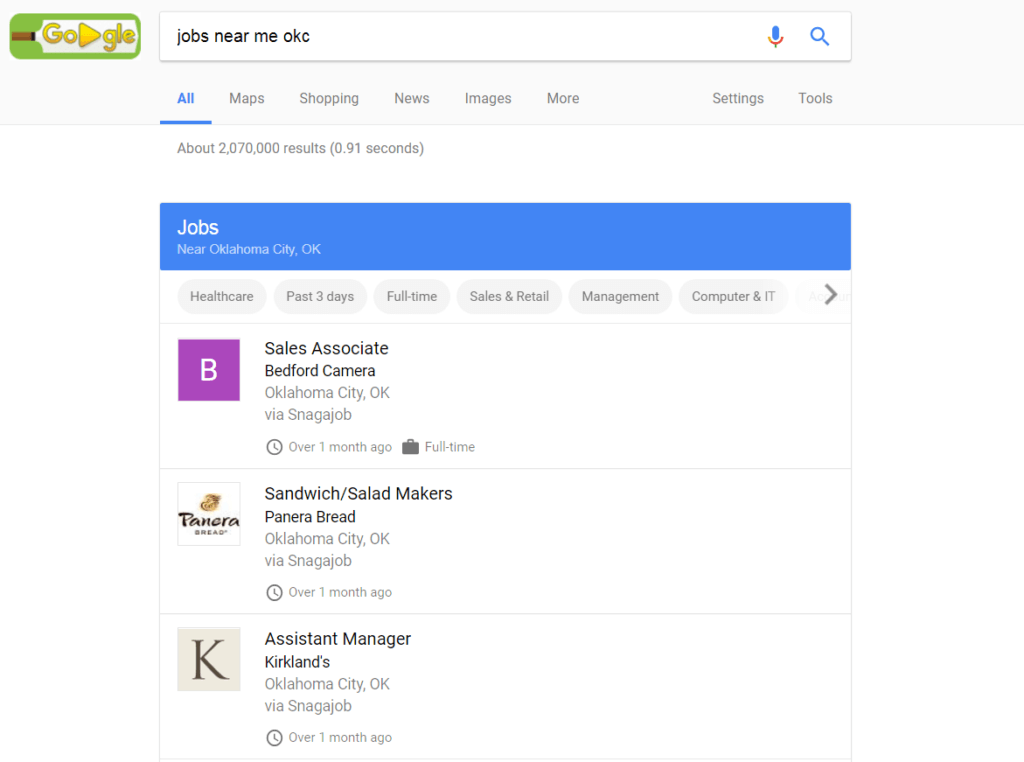Having spent the past 20 months seeking steady, full-time employment in the public relations industry, I am always looking for something to improve my chances of success in that endeavor. Whether it is changing searchable words in my résumé or creating yet another cover letter or just the time spent looking for the right position, job searching is a tiring duty that eats up a lot of time and, thus far, has proven unsuccessful.
Prior to the need to delve into the world of job searching, I had been informed of a catch-all job-search website called Indeed.com, which gathers job data from what had once been the individual job search websites such as Monster and HotJobs. It allowed me to go to one website rather than several to get the bulk of the jobs I would be searching for.
What I found, however, is that not all the jobs were on Indeed. I still found myself using LinkedIn, Oklahoma City’s chapter of Public Relations Society of America, the Center for Nonprofits website, and the state and federal job sites to make sure I was covering most of my bases. Sometimes, jobs I found on those individual pages would be on Indeed as well, but not always.
A couple of weeks ago, I was turned on to Google’s new job-search functionality, which allows the user to seek job openings by category, title, city, date posted, type, company type and employer. Indeed, on the other hand, allows for job searches by job title, keywords or company name, which generally will get you the same information.
Google’s job searches complementary, problematic

Google Search seems to be a decent complement to Indeed, but some of the jobs Indeed provides me as part of my daily report didn’t show up on the list of jobs for “public relations” on Google Search. Considering what we know about how Google seems to have access to just about everything that exists (and maybe some things that don’t exist), it seemed likely that Google was positioned to potentially dominate job searches based on what it already knew about me.
As it turns out, Google Search works about the same as searching on Google but with more structured search options. So, for that, it has the potential to be helpful. I did find one job in the initial report that I didn’t see anywhere else, and I applied for it. As it turns out, the job had already been filled despite it showing up at the top of the Google Search list. Those of us in the job-seeking industry refer to that as “not helpful at all” and a “complete waste of time.”
The press release announcing Google Search talked about how 46 percent of employers “face talent shortages and have issues filling open positions.” My experiences tell me they may need to have a long talk with their HR people, who seem to be standing in the way of identifying talent. I’m sure they are trying to work that out.
Since Google is now in the market of helping employers improve visibility in the job market, I actually have some helpful tips from the prospective-employee side that might also get the right people in front of these employers who can’t seem to locate talented workers.
Five ways employers could improve the application process
First of all, why do you need my résumé AND for me to waste 30 minutes or more filling out that EXACT same information on your website? Spend some money on software that will place my résumé information into your database and let the job seekers move on to more productive things. You know, like continuing to find a job.
Want my social security number? Hire me, then it’s all yours. If you require it as part of applying for the job, then you are going to lose a ton of talented workers who aren’t comfortable providing their private identification information to complete strangers.
Would I like to donate an additional hour of my time filling out one of those personality profiles that you insist isn’t going to affect your decision to hire someone? No, thank you. I’ve talked to people who insist they get nothing out of those, yet some companies still require you to answer the never-ending questions that have nothing to do with the job. They are a complete waste of time.
Another annoyance are the work projects we are assigned prior to a decision being made. Are you really that desperate for ideas that you have potential employees do the work for you? That’s what the purpose of a portfolio is: to provide you with actual work that is applicable to the job. I shouldn’t have to provide the template for the first project to be worked on by the person who gets the job.
Finally, once you have completed the interviews and decided who you are going to hire, it is no longer just common courtesy to inform the others they didn’t get the job. If I am going to pay for my gas, my parking and my time to meet with you in person, I don’t think it is asking too much for you to send me a pre-written email thanking me for my interest and letting me know you chose “a more qualified candidate.” Nothing is more frustrating than to be told you will hear back regardless of the decision and then never hear back from the company. Especially if I am going to take the time to follow up to check on the progress of the decision, ignoring me doesn’t build your reputation.
Employers should demonstrate common sense in hiring process
Does Google Search work to improve the chances of getting talented prospective employees in front of companies in need of talented employees? Maybe. Is there a lack of search options for prospective employees? Not necessarily.
Let’s focus on what needs to be fixed instead. Those of us in the job market would appreciate knowing the companies we apply to can use common sense when working with prospective employees during the interview process. First impressions do count for something, after all.





















